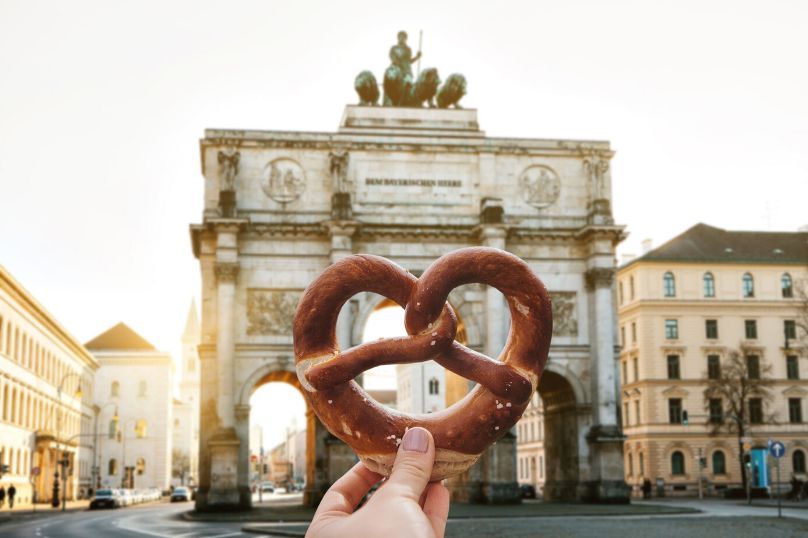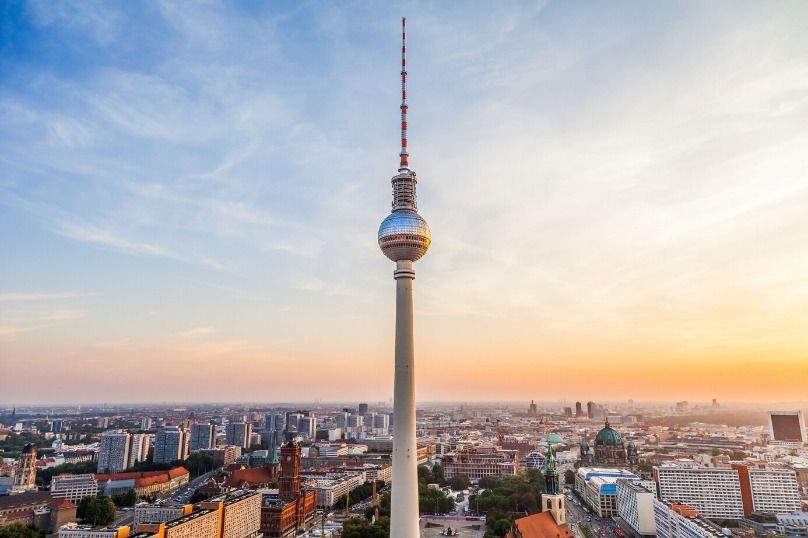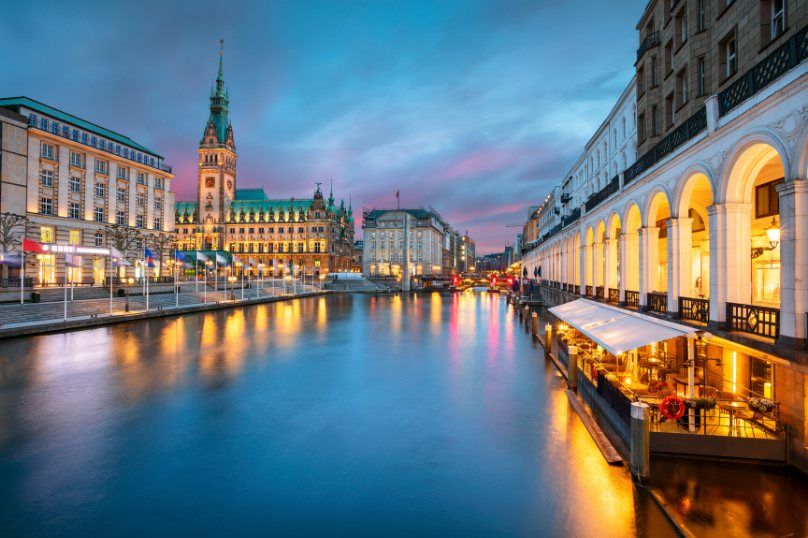Germany is the eighth most visited country in the world, and once you visit, it’s easy to see why. It’s home to stunning forests, picturesque Bavarian towns, castles, and modern cities, and it’s renowned for its beer, Christmas markets, the Autobahn, and its pivotal historical significance in the twentieth century. Germany has something for everyone, and this Germany travel guide has everything you need for planning a trip!
Germany
Ready to plan your trip? Then here’s your ultimate Germany travel guide!

Top Places to Visit in Germany
Nuremberg
Rothenburg
The Rhineland
Typical Travel Costs
Exchange Rate
The currency in Germany is the Euro. Exchange rates are subject to fluctuations, so be sure to check this as your trip approaches. On average, €1 is equal to about £.87 British Pounds, $1.10 U.S. and 7.8 Chinese Yuan.
Accommodation
A hostel or budget hotel room is in the €15-40 a night range (£13-34.75, $16.50-$44, 115-313 Yuan). A mid-range hotel will be around €60–120 a night (£52-104.25, $67-$133, 462-923 Yuan). More luxury hotel rooms will start at €150 a night (£131, $167, 1154 Yuan) and can go up to thousands of dollars a night.
Airbnb prices average around €52 (£45, $58, 400 Yuan) a night.
Food
Food from a street stand or market will be around €5 (£4.25, $5.50, 38.50 Yuan). A quicker casual meal at a cafe will be about €10 (£8.75, $11, 77 Yuan). A multi-course meal at a gourmet restaurant will be between €20-40 (£17.50-35, $22-$44.50, 154-308 Yuan). And a meal in an elegant or top-rated restaurant will start around €75 (£65.25, $83.50, 577 Yuan) and can go up to hundreds of dollars per dish.
For alcohol, include around €3 a drink (£2.60, $3.50, 23 Yuan) for beer and wine into your budget. If you’re going to have several drinks or are with a group, getting bottles or pitchers to share could save you money.
Here Are 10 Must-Try German Foods!
Transportation
Public transportation within a city’s limits will be between €5-7 for a day pass (£4.25-6, $5.50-7.75, 38.50-54 Yuan). Transportation between towns can range from €40-150 (£35-130, $51-103, 358-716 Yuan) depending on where you’re traveling, what class and amenities you want, and how far in advance you book your ticket.
Renting a car will be about €15-25 a day (£13-21.75, $16.50-27.50, 115-192 Yuan), and then you’ll need to pay for tolls, gas, and parking. Please keep in mind that gas can be double or triple the price in the U.S. If you’re planning to be mostly in larger cities, I wouldn’t recommend a car. Parking rules are strict, spaces are scarce, and parking is quite expensive.
Taxi fares are standardized, but they vary from city to city. The base fee will be €2-3 (£1.75-2.60, $2.20-3.30, 15-23 Yuan), then €1-3 (£.87-2.60, $1.10-3.30, 7.50-23 Yuan) per kilometer. Surcharges may apply at night and for larger vehicles or bulky luggage. Some taxis accept cards but be prepared to pay with cash. It’s customary to tip drivers 10% rounded to the nearest euro.
UberTaxi is available in the larger cities, which means you can use the Uber app to order a regular taxi. Lyft doesn’t operate in Germany.
Other Expenses
I’d budget around €45 a day (£40, $50, 346 Yuan) for entrance fees, tours, guides, snacks, tips, and souvenirs.
ATMs are readily accessible in cities, but they’re not as common in smaller towns. Only use larger international bank ATMs; otherwise, you’ll pay excessive transaction fees.
Credit cards aren’t commonly accepted in Germany, so you’ll always want to have cash on you. International hotel chains, high-end restaurants, and boutique or department stores usually accept Mastercard and Visa, but be prepared to pay with cash everywhere else.
Tipping
€1 per bag for hotel attendants, and €1-2 per day for hotel room cleaners. As I stated earlier, tip about 10% for taxi rides. And you can tip toilet attendants with whatever loose change you have readily available.
At restaurants, your bill will include a bedienung (service charge). But it’s still customary to tip an additional 5% or 10% unless your service was terrible. And when you’re at a bar, tip 5% rounded to the nearest euro.
Suggested Daily Costs
These budget estimates include eating and drinking out at least once a day and a couple of train rides between cities.
Lower End: €110 a day (£96, $122, 845 Yuan). Midrange: €120-200 a day (£105-174, $134-223, 920-1536 Yuan). Higher End: €250 a day and up (£217, $278, 1920 Yuan).
MONEY SAVING TIPS
How to Prepare for Germany
Vaccinations
The Centers for Disease Control and Prevention (CDC) and World Health Organization (WHO) recommend the following vaccinations: hepatitis A, hepatitis B, rabies, meningitis, polio, measles, mumps and rubella (MMR), Tdap (tetanus, diphtheria, and pertussis), chickenpox, shingles, pneumonia, and influenza.
Passport Health has additional information on current vaccinations and diseases in Germany, and I recommend visiting their website for the most up-to-date travel requirements.
Visas
For entry, nationals of the U.S., Canada, Australia, and Great Britain will need a passport valid for at least three months beyond your return date. EU nationals will need a valid passport or national identity card for the length of their stay, but it doesn’t have to be valid beyond your trip. All other nationals should have a passport valid for at least three months past their stay.
Most nationals don’t need visas when visiting Germany for less than 90 days. And EU nationals can stay indefinitely without a visa.
The World Travel Guide has more information on Germany’s visa and passport requirements.
iVisa is an incredibly helpful resource for obtaining visas. iVisa makes the usually complicated and confusing process of getting a visa easy by taking care of everything for you. You fill out a simple online application, and then iVisa takes care of everything else.
Etiquette
When greeting someone, shake hands and say Guten Morgen (before noon), Guten Tag (between noon and 6 pm), or Guten Abend (after 6 pm). If you’re speaking German, use the formal Sie (you) with strangers and only switch to the informal du if invited to do so or if you’re addressing a close friend or child.
For toasting with wine, use Zum Wohl, and for toasting with beer, use Prost.
To eat like the locals, hold your fork in the left hand and your knife in the right. And to signal that you’ve finished eating, lay your knife and fork parallel across your plate.
For Planning Your Trip
When To Go
Germany’s high tourism season is July and August. January and February are the high seasons for the ski resorts, and Oktoberfest is the high season for Munich. Tourists, lines, traffic, and prices will be at their peak during these times.
Germany’s shoulder seasons are from April – June, and September – October (minus Oktoberfest in Munich). There are fewer tourists, lower prices, and sunny, temperate weather during these months. You’ll see beautiful blooming flowers in the Spring and stunning foliage during the Fall.
Germany is one of the Best Destinations To Visit In October!
The low season is November – March. It’s colder during these months, and most places are open fewer days a week and for shorter hours a day. But travel costs can be more than 50% less during these months.
Because some trails and sites close during the winter months, make sure your top destinations and attractions will be open.
What To Pack
In addition to your usual travel essentials, you’ll want these items in Germany:
Day pack, water bottle, and hiking shoes since you’ll probably be hiking at least one trail or to at least one castle. If you’re doing any long treks, make sure you have any specialized clothing or equipment you might need.
Rain jacket because there’s always a chance of rain. If you’re here in the winter months, you’ll want several warm layers and a waterproof outer layer for rain, sleet, or snow.
But even if you’re here in the Summer months, you’ll want a lightweight fleece, sweater, or mid-weight jacket. It can be chilly year-round in the mornings and evenings in the higher elevations.
Electrical outlets in Germany are Types C and F. So if you’re from the EU, you won’t need an outlet adaptor. But British, U.S., and other travelers will need an adaptor.
What To Wear
For the most part, Germans dress simply but fashionably. So, to dress like the locals, pack practical dressy-casual clothes. Long or capri pants, skirts, and dresses for women and long pants for men. You won’t see the locals wearing shorts unless they’re swimming.
Now, you can wear athletic gear, white tennis shoes, or graphic tees, but your appearance will single you out as a tourist. I’ve found that when traveling, it’s usually better to blend in. It’s also respectful to dress as the locals do.
It’s smart to have a layer on hand when you’re visiting churches or other religious sites to be able to cover your shoulders if needed.
Bring your most comfortable shoes! You’ll be walking A LOT, and you’ll spend a lot of time on cobblestone sidewalks or streets.
Have you been here? Comment below with anything you’d add to this Germany travel guide!

Shop My Germany Essentials

Frequently Asked Questions
What should I avoid in Germany?
Common mistakes you can make in Germany:
1. Being late. This is considered extremely rude in Germany.
2. Raising your voice or “losing your cool” in public are not acceptable behavior.
3. Jaywalking. This can be a serious offense in Germany.
4. Talking about World War II, Hitler, or Nazi Germany. Don’t bring these subjects up.
5. Leaving your bag unattended or having your wallet in an unsecured pocket. Pickpockets are common in all of France’s cities.
What is the best time to visit Germany?
Germany’s high tourism season is July and August. January and February are the high seasons for the ski resorts, and Oktoberfest is the high season for Munich. Tourists, lines, traffic, and prices will be at their peak during these times.
Germany’s shoulder seasons are from April – June and September – October (minus Oktoberfest in Munich). There are fewer tourists, lower prices, and sunny, temperate weather during these months. You’ll see beautiful blooming flowers in the Spring and stunning foliage during the Fall.
The low season is November – March. It’s colder during these months, and most places are open fewer days a week and for shorter hours a day. But travel costs can be more than 50% less during these months.
Because some trails and sites close during the winter months, make sure your top destinations and attractions will be open.
How many days is enough for Germany?
If you want to visit multiple cities and regions in Germany, you’ll want at least 10-14 days. This will give you enough time to explore a couple of different regions by train or car at a relaxed and enjoyable pace.
Is food expensive in Germany?
Germany’s food prices are relatively low compared to other travel costs, especially when compared to neighboring countries such as France, Italy, Austria, Sweden, and Belgium.
How much money do you need per day in Germany?
Expected travel costs in Germany, plus airfare:
Lower End: €110/day per person (£96, $122, 845 Yuan).
Midrange: €120-200/day per person (£105-174, $134-223, 920-1536 Yuan).
Higher End: €250+/day per person (£217, $278, 1920 Yuan).
Is Germany expensive for tourists?
Germany is a relatively inexpensive destination compared to other countries in Western Europe. But Germany is a relatively expensive country to visit compared to other regions in the world.
Here are some money-saving tips in Germany:
1. Most museums have designated days with free entry. So if there’s a museum you want to visit, check to see if it has a free admission day, and plan accordingly.
2. Food from street vendors can still be a hearty, large-portion, full-meal for much cheaper than restaurants.
3. Buy local beer brands instead of the more expensive national beer brands.
4. Book your train tickets between cities and towns as soon as possible. Rates will increase closer to your travel days.
Will my debit card work in Germany?
ATMs are readily accessible in cities, but they’re not as common in smaller towns. Only use larger international bank ATMs; otherwise, you’ll pay excessive transaction fees.
Credit and debit cards aren’t commonly accepted in Germany, so you’ll always want to have cash on you. International hotel chains, high-end restaurants, and boutique or department stores usually accept Mastercard and Visa, but be prepared to pay with cash everywhere else.
What is the rainiest month in Germany?
June is the rainiest month in Germany.

This Germany travel guide is not a sponsored post, and, as always, the thoughts and opinions expressed in this Germany travel guide are entirely my own. Some of the links in this Germany travel guide are affiliate links, and, at no cost to you, I may earn a small commission.
November 6, 2019
 Travel Shop
Travel Shop Merch
Merch Travel Tips
Travel Tips
 Photography
Photography Points & Miles
Points & Miles Credit Cards
Credit Cards

























